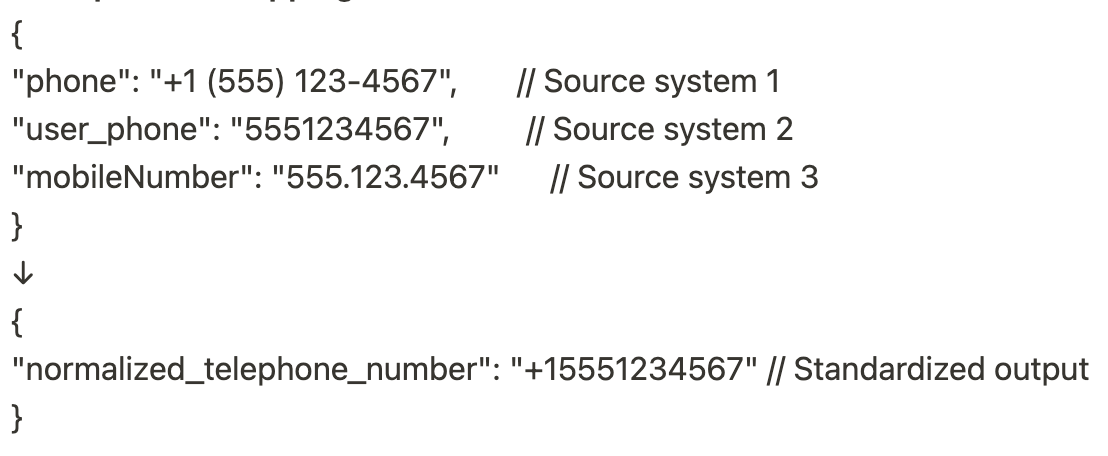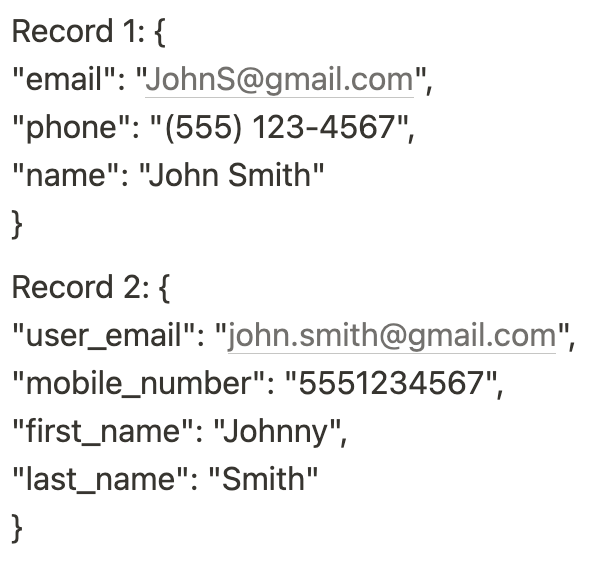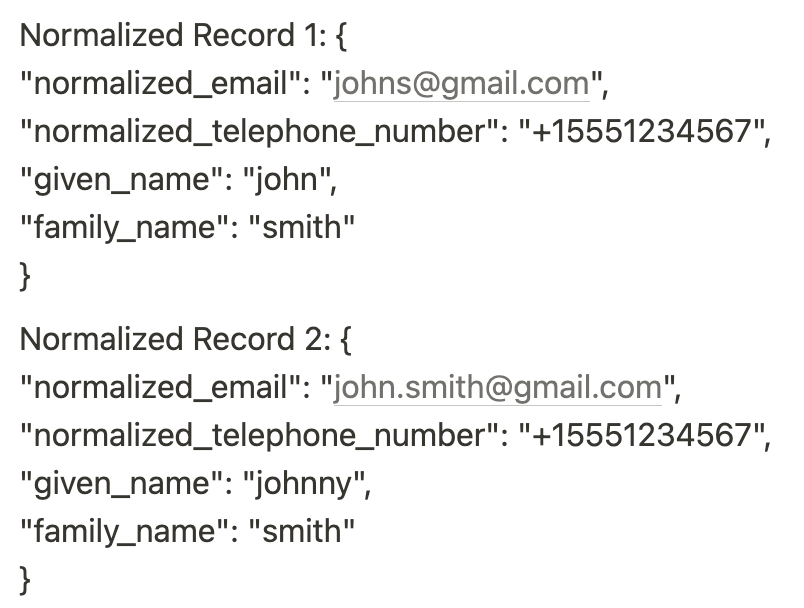In the digital ecosystem, identity data is the cornerstone of meaningful customer relationships—but it's typically scattered across multiple systems, formats, and schemas. When customer data exists in silos, it creates blind spots that impact everything from personalization to attribution. What you need is a common language for identity that can bridge these disconnected systems.
The Identity Resolution Challenge
Modern businesses face three fundamental challenges with identity data:
- Structural Inconsistency: Every system has its own schema. One platform calls it "email_address," another labels it "email," and a third simply uses "contact."
- Format Variability: Even when fields represent the same data type, the formats differ—phone numbers might include country codes in one system but not another, or emails might be stored in different cases.
- Matching Complexity: Determining whether two customer records represent the same person requires sophisticated comparison logic that considers various attributes and their significance.
Rosetta Stone: The Foundation of Composable Identity
Narrative's Rosetta Stone AI Model is the essential translation layer that makes true identity resolution possible. Named after the ancient stone that unlocked Egyptian hieroglyphics, our solution brings clarity to the complex language of identity data.
How It Works: Technical Mechanics
Rosetta Stone employs a multi-layered approach to normalize and prepare identity data:
- Semantic Recognition
The system automatically identifies the intent behind various field names through semantic analysis. Whether it's labeled as "phone," "telephone_number," or "contact_phone," Rosetta Stone recognizes these fields represent the same identity attribute and maps them to standardized fields like normalized_telephone_number.
Example field mapping transformation

- Format Standardization
For each identity attribute, Rosetta Stone applies domain-specific normalization rules:
- Emails: Lowercase conversion, normalization of username and domain parts
- Phone Numbers: Removal of formatting characters, standardization with country codes
- Names: Case normalization, handling of common nickname variations
- Addresses: Standardization of abbreviations, consistent formatting
- Advanced Feature Extraction for Complex Comparison
Once normalized Rosetta Stone can employ sophisticated feature extraction logic - breaking down identity attributes into overlapping fragments that serve as fingerprints for comparison:
- Character Features: Creates n-character sequences (typically 3-5 characters) that enable fuzzy matching even when typos or minor variations exist.
- Field-Specific Features: Uses different strategies based on field semantics. For example, email feature extraction separates username and domain parts, treating domains as complete units while breaking up usernames character by character.
- Pattern-Based Features: Applies specialized fingerprinting for structured formats like phone numbers, extracting meaningful components like area codes.
Example of email feature extraction with Rosetta Stone
This feature extraction approach enables high-performance similarity calculations across millions of identity records, making it possible to determine when two different representations likely refer to the same entity.
Real-World Impact: Identity Resolution at Scale
Where Rosetta Stone truly shines is in unifying identity data across your enterprise. By integrating with Narrative's Query Language (NQL), you can:
- Automate Normalization: Let the system handle normalization based on semantic understanding, eliminating the need for manual data mapping exercises.
- Leverage Powerful Matching: Utilize the normalized data with built-in similarity functions that understand the relative importance of different attributes through machine learning.
- Compose Custom Solutions: Build identity resolution workflows tailored to your specific business requirements by connecting normalized data sources with matching algorithms and graph building configurations.
Consider how this transforms a typical identity resolution challenge:
Before Rosetta Stone: Incompatible records
After Rosetta Stone: Matchable normalized records
Result: High similarity score (0.94) indicating likely match
With Rosetta Stone, the system can confidently determine these records represent the same person despite variations in formatting and slight differences in the provided name.
Beyond Basic Normalization: Identity Graphs That Learn
The true power of Rosetta Stone emerges when combined with Narrative's full Composable Identity solution:
- Weighted Similarity Models: Once data is normalized, the system employs sophisticated similarity models with learned weights for different attributes—giving more importance to rare or highly predictive fields.
- Adaptive Matching: The matching algorithms adapt to your specific data characteristics, understanding which fields are most reliable for identifying unique individuals in your context.
- Continuous Refinement: As more data flows through the system, the identity resolution capabilities improve, creating a positive feedback loop that enhances matching accuracy over time.
Take Control of Your Identity Data
If your team is still struggling with the complex puzzle of identity resolution, Rosetta Stone offers a path forward that combines technical sophistication with practical usability. By establishing a common language for identity data, you can finally unlock the power of unified customer profiles across your organization.
Rather than building brittle, hard-coded data pipelines that require constant maintenance, Rosetta Stone enables a flexible, composable approach to identity resolution—letting you focus on using identity insights rather than struggling to create them.
Ready to see how Rosetta Stone can transform your approach to identity resolution?? learn how Narrative can bring clarity to your identity data ecosystem.